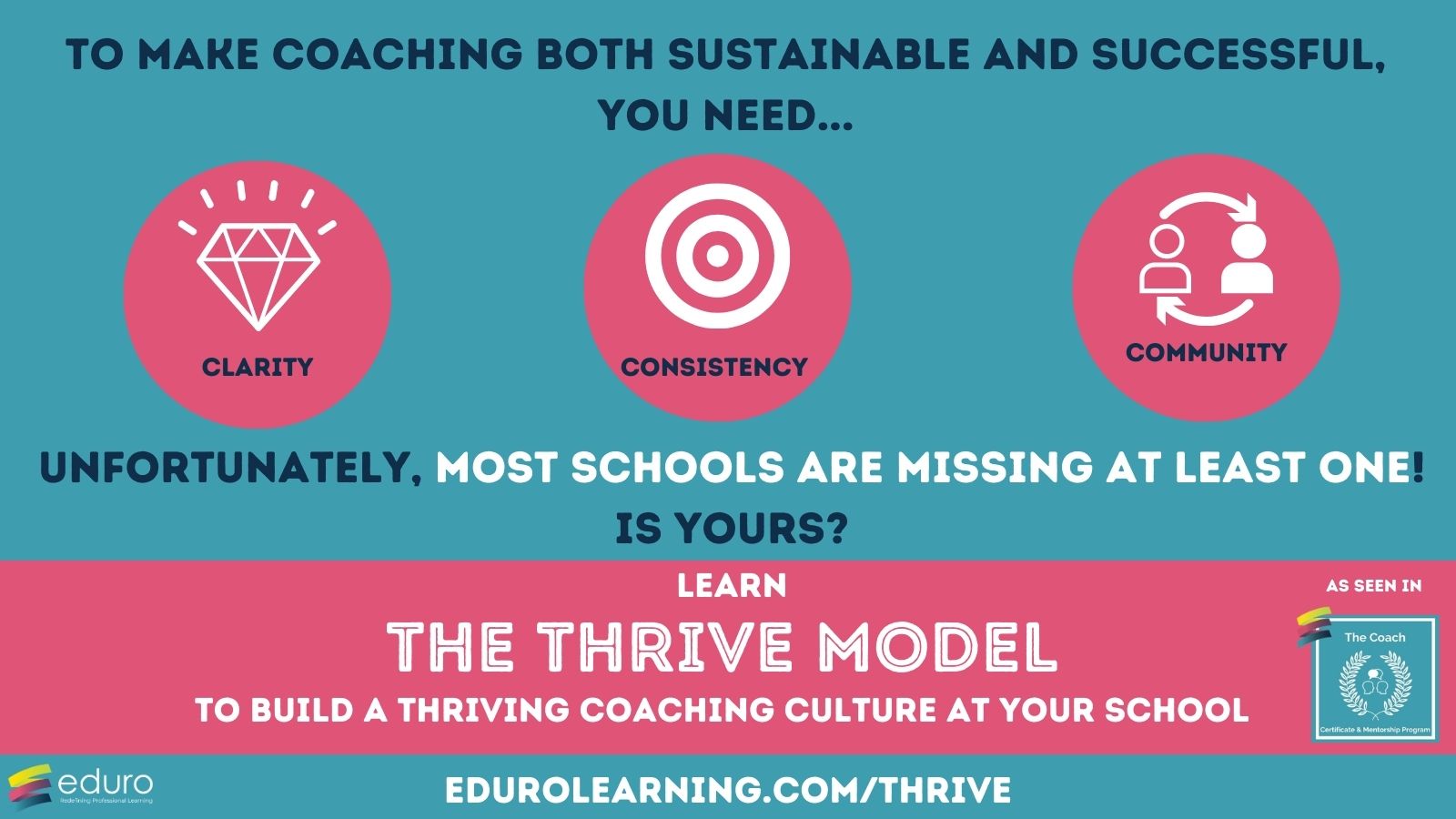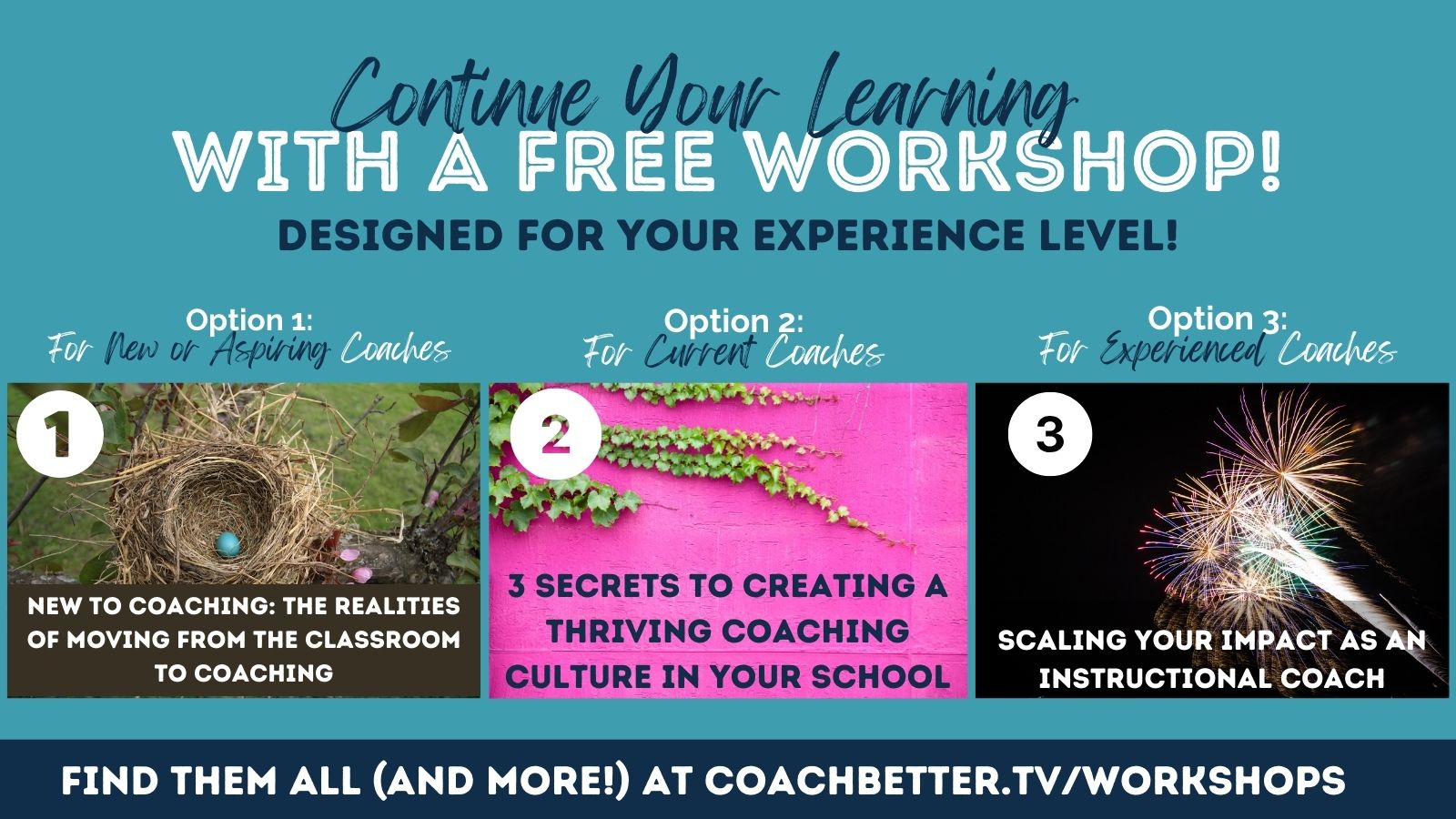This #coachbetter episode is part of our series featuring coaching conversations with one of Kim’s amazing clients, Cary Hart, who is a graduate of all 3 of our Certificate Programs: COETAIL, The Coach, and Women Who Lead. HUGE thank you to Cary for being willing to record one of her coaching sessions to share with all of you!
In Kim and Cary’s conversation, you’re going to hear how having a coach from outside of your school community can take a very complicated situation, with a lot of layers, detail, and complexity, and through targeted questions, paraphrasing and intentional focus, surface a simple and systemic solution. The challenge Cary presents in this call is one that, if you’ve been a tech coach in particular, will be very familiar to you, so some aspects of the solution here might be immediately applicable to your school setting, too. You’ll notice the ways that Cary was able to share the different dynamics of her challenge, and through Kim’s paraphrasing, questioning, and identifying the root of the issue, they were able to move onto a deeper discussion of potential solutions that address all of the layers to this challenge that Cary’s been struggling with.
Connect with our Featured Guest
Subscribe to #coachbetter via your favorite Podcast Player!
Bonus! Watch the Spotlight Version on YouTube!
SHOW NOTES
Joined Carol Morgan School in August this year, after leaving Russia unexpectedly in March & having to job hunt unexpectedly. Joined a program that was in development, not well defined, but also no pre-set notion of what it could / would be.
I was brought in with the express purpose to build a design / maker studio in the elementary school, along with robotics, green screen, and 3D printing. My job was to bring “all of the things” to elementary school. Previous model was drop your kids off in the lab. 3 people in the ES, split over different grade levels. Titles changed to “innovation” with flexible understandings of what that meant.
Overarching vision, but not everyday vision. Needed me to take the program from vision to implementation. I had the history & experience, which is what got me the job. Exciting to come into this space because I got to develop a program again.
Team members have been at the school for a while. Neither of them had any experience to pull from for this position. LIT Facilitator (Learning Information & Technology)
How do I push but not be pushy?
Content & Curriculum:
Coming from a school with strong requirements for collaboration through PYP. This school doesn’t have that requirement, the school advertises itself as an American school and is very American based on my understanding. Someone from the LIT team asking questions about curriculum is not something they’ve had any experience with. Trying to figure out how to push teams and team leaders to include me in the conversations about what’s happening in the classroom, but it’s not natural to them. New math & science curriculum sets. New push with Writing & Reading with Lucy Calkins.
Leadership Team:
How much do I push the leadership team, about what I think the program should be, vs their plans that I might not know anything about?
Team:
My team hasn’t had much experience, how much do I push them out of their comfort level? There’s no textbook to work from. Every year is different, and we have to plan from scratch every time. I thrive in this environment, but I don’t know how comfortable the team is with that environment. They seem to be ok with it, but they’re sticking with “safe-ish things”
What I don’t want to do is turn someone off of working with us, because we’re always pushing us to do things we don’t want to do. I don’t want them to think “oh no, here comes Cary”
EXPLORE THE THRIVE MODEL
Are you working on building a coaching culture in your school setting?
To make coaching both sustainable and successful, you need clarity, consistency, and community.
Unfortunately, most schools are missing at least one! Is yours?
Use the Thrive Model to find out!
Developed after working with hundreds of coaches and leaders in international schools around the world, the Thrive Model incorporates both the macro view of a coaching program, and the micro view of a coaches practice, to bring together the three essential elements to make coaching both sustainable and successful.
Explore all of our resources about the Thrive Model at edurolearning.com/thrive

SHOW NOTES continued…
Successful:
Send an email noting what’s in the curriculum coming up
Follow up and stop by and ask them
Because I’m a stand-alone class, I’m making connections where I can, but not force them into something that’s more than what’s possible at the moment
Haven’t had anyone slam on the breaks – just genuine confusion about why this is happening
Less successful:
Focus everything through team leaders
Learning how much I need to communicate through the whole team, not just the team leader
Having to put on the brakes – struggle to me not being able to push as far as I know the school could go
Next steps:
Clarity about the vision / plan – we need this to present to the teams – without thinking about the actual content that gets taught – just the structure of what the program looks like, sounds like, feels like, what teachers are doing, what students are doing?
Coaching Menu: ES LIT Menu: here’s what we think gr 5 should do in a year, here are the ones we’re not going to do, ask the grade 5 team
Needs to be clearly described how the content vs skills is delineated between classroom & tech – and then sell them on the fact that they can use those skills again independently in their classroom
Support & align what you’re doing in the classroom, but also provide skills that they can use again at a later day/time
How can you provide clarity for your school leaders – in writing: what will this look like, sound like, feel like, what will teachers & students be doing, at each stage of the process. What are the milestones we need to achieve to make sure we’re moving in this direction.
Then set the timelines and priorities together
Clarity / vision
Structure (Boxes)
Broad strokes timeline (what will this look like at each year of the process)
Milestones / benchmarks (point to stop & reflect & adjust)
What was most helpful from our conversation today?
Listening to me and taking a rambling thing, and identifying exactly what I need to focus on. One idea clarified what we’d been already going through and framing that in a way that makes it clear how we could manage it systematically in a bigger picture context. Needed that spark of an idea for how to frame our challenge with a solution.
Ready to Learn More about Finding Solutions to Coaching Challenges?
If you’re ready to dig deeper into solution-focused coaching conversations – or if you’re new to instructional coaching and you’re curious about getting started, join us for one of our courses for coaches!
To learn more about these options, we have three FREE workshops to share with you today.

For New or Aspiring Coaches
If you’re just getting started as a coach, and you want to be successful in your early years, watch our New to Coaching Workshop, which highlights the key mindset and skill set shifts you’ll need when moving from the classroom to a coaching role. The workshop will also tell you all about our online course, Getting Started as a Coach. This course is specifically designed for classroom teachers who are moving into a coaching role so you’re prepared for the transition. It’s focused on exactly the skillset & mindset shifts you need to so you can be successful in your first years as an instructional coach.
For Experienced Coaches
If you’re already a coach & you want to think about being more intentional & strategic in your practice, watch our workshop on the Thrive Model for Coaching Success which will help you evaluate your program and your practice to see where you may have room to grow. You’ll walk away with a clear picture of exactly what you need to focus on to build a thriving coaching culture – and help you decide if our year-long mentorship and certification program, The Coach, is right for you, right now. This program is designed for current coaches who are focused on building a coaching culture through intentional and strategic coaching work at all levels – with teachers and school leaders.
For Coaches Ready to Lead
For experienced coaches ready to look at the bigger picture of the school to see what might be supporting or hindering the sustainability of the coaching program, and you want to make sure your school has all of the systems and structures in place, watch our workshop: Scaling Your Impact as an Instructional Coach. You’ll get a bird’s eye view of what’s needed to make coaching sustainable for you as an individual coach and for your school. When you’re ready to put that learning into action, join us in our online course for coaches ready to lead: Coaches as Leaders and put it all into practice – with support from Kim and our global cohort! This course is designed for experienced coaches, ready to lead.
You can find all the workshops on our coachbetter website at coachbetter.tv/workshops
Wherever you are in your coaching journey, we can support you!
For All Coaches
Connect with us!
- Subscribe to the podcast iTunes | Spotify | Stitcher
- Follow us on social media: Twitter | Instagram | LinkedIn
- Join our #coachbetter Facebook group
- Explore our courses for coaches
![Coaching Call: Designing Systemic Solutions to Complex Problems with Cary Hart [Ep 232]](https://res.cloudinary.com/edurolearning/image/upload/v1706990757/coachbetter%20Podcast/Cary_Hart_Coaching_Call_kpoc9q.jpg)




Recent Comments